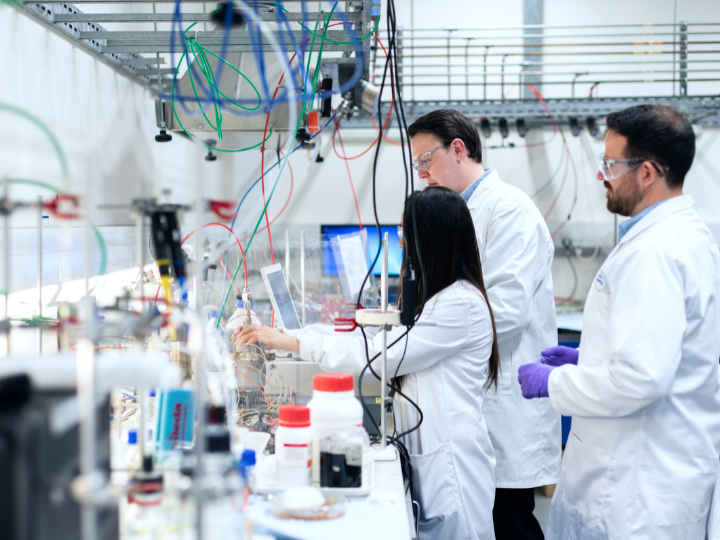by Jake Baum and Charles Bangham*
How can we prepare for the unknown? The truth is no-one expected a coronavirus pandemic: we were all waiting for influenza. In the 1980s, public health services were not on the lookout for a deadly retrovirus with a decade-long incubation period, but along came HIV/AIDS. Forty years on, would we be any better prepared if HIV appeared for the first time now?
In the same decade, misfolded proteins – prions – were found to be the cause of Bovine Spongiform Encephalopathy (BSE), mad cow disease. Prions are not even conventional pathogens, like bacteria, fungi, viruses, or parasites. Are we ready to detect and combat another one if it emerges?
The challenge is to prepare for a future infectious disease threat that is unexpected or, worse, entirely unknown. The world has scrambled to understand, contain and attack the SARS-CoV-2 virus in an unprecedented mobilisation of global science. Most of us believe we will conquer it. And yet we are all conscious that our collective guard was down when COVID-19 first emerged.
We cannot afford to repeat this mistake. As institutions and nations take ‘pandemic preparedness’ seriously – and invest accordingly – policymakers, funders and taxpayers reasonably ask: which infection should we prepare for, and how? The answer lies in the concept of interdisciplinarity: we will need to bring together researchers from diverse disciplines.
The vision of the lone scientist in the laboratory winning the war on infection is far from modern reality. It has never really been true. Antonie van Leeuwenhoek, the father of microbiology, made the first observations of bacteria and microbial life in the 1670s through his own custom-made microscopes. And yet it was innovations in glass manufacturing and lens-making that enabled Leeuwenhoek to make his transformative discoveries. The spark of insight always went hand in hand with technology and innovation in other sciences.
Today, transformative discoveries rely more than ever on connections between technologies and original thinking. The concept of an RNA vaccine, for example, is not new; it had been around in laboratories and industry for many years.
And yet it is the innovation of lipid nanoparticles, engineered nanoscale delivery systems that carry RNA, that enabled the recent transformative success of this technology. Immunologists, material scientists and engineers needed to come together to bring about the RNA-based vaccine revolution. So, while investing in fundamental science remains the bedrock of discovery – and probably the best insurance policy against any future crisis – in order to be truly prepared we must invest in initiatives that bring people, technology and ideas together from different fields.
Interdisciplinarity is behind nearly all the game-changing innovation that is now in use in the current pandemic. Clinicians, natural scientists, engineering and computational scientists all cooperated to deliver the key components of COVID-19 pandemic control. And the need for workers from different fields to cooperate in this way will continue to grow.
Future diagnostics will need to do more than just detect an infection: a single device will need to quickly identify and measure several different factors - pathogen, drug resistance, host sensitivity - both for individual treatment and to feed epidemiological monitoring. Future vaccines will need to pre-empt pathogen evolution, using machine learning to predict mutations that might arise. And they will need to be even safer, manufacturable at scale quickly (and locally), and deliverable to the entire global population, not just wealthy nations. Mathematical modellers of infectious disease - a mainstay in news feeds during the current pandemic - will need to integrate clinical and social sciences together with pathogen biology and state-of-the-art monitoring to accurately understand the complex shifting dynamics of disease spread.
No single discipline, group, or technology can meet the challenges of understanding and combating future infections. Instead, it will be critical to break down barriers between traditionally separate disciplines such as mathematics, chemistry, biology, medicine, and engineering. We need to create forums where scientists, policy makers, technologists, and industry meet to share ideas and create innovations.
It is with this interdisciplinarity in mind that Imperial College London launched an Institute of Infection: to break down the barriers between medics, engineers, natural scientists and economists in the battle against infectious disease. By embedding interdisciplinarity into its fabric, the new Institute will incubate infection innovation, training the next generation of scientists to think differently about infection. We hope others will follow.
To prepare for an unknown future pandemic or infection outbreak of any sort, we must learn a key lesson from more than 350 years of microbial and infectious disease research: breakthroughs happen when disciplines come together. There is no new single path that can adequately prepare us for the future. Rather, we need bridges between existing paths: that’s where we’ll find tomorrow’s critical innovations to combat infection.
*Co-director, Institute of Infection, Imperial College London and Co-director, Institute of Infection, Imperial College London
**first published in: www.weforum.org




 By: N. Peter Kramer
By: N. Peter Kramer
